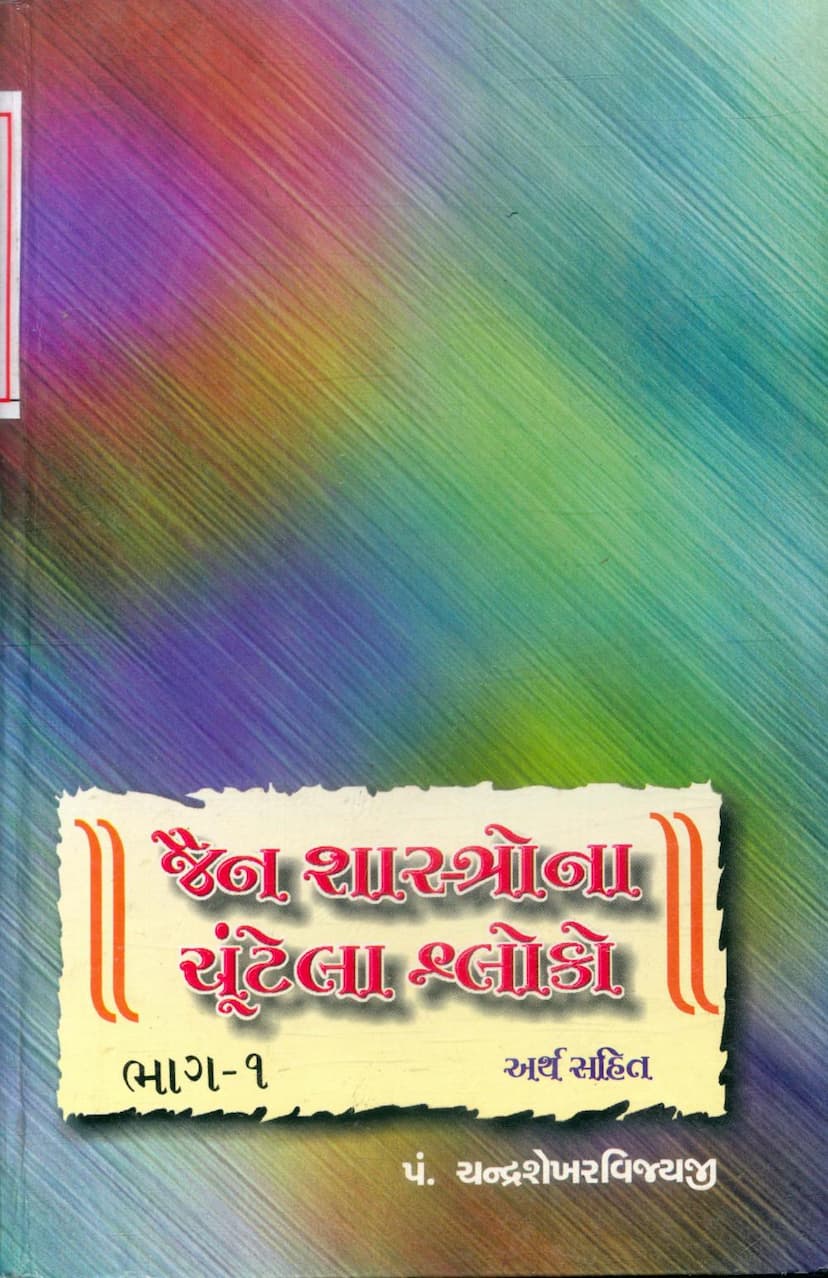Jain Shastrona Chuntela Shloko Part 01
Added to library: September 2, 2025
Loading image...

Summary
This document is the first part of "Jain Shastrona Chuntela Shloko" (Selected Shlokas from Jain Scriptures), compiled by Muni Shri Gunhansvijayji and inspired by Pandit Shri Chandrashekharvijayji. Published by Kamal Prakashan Trust, Ahmedabad.
Key highlights from the provided pages:
- Purpose of the Book: The book aims to compile approximately one thousand beautiful shlokas from twelve to fifteen Jain scriptures. These shlokas are presented in two parts for ease of carrying during travels. The intention is that memorizing even one shloka daily for three years would lead to the completion of one thousand shlokas. Regular recitation (300-500 shlokas daily) with contemplation of their meaning is expected to foster daily detachment and increase the joy of spiritual life.
- Author and Compiler: The inspiration for this compilation comes from Pandit Shri Chandrashekharvijayji, described as a "Siddhant Mahodadhi" (Ocean of Principles) and "Saccharitruchudamani" (Crest Jewel of Right Conduct). Muni Shri Gunhansvijayji is credited as the compiler.
- Publication Details: The book is published by Kamal Prakashan Trust. The author's introduction mentions that the work was completed by Kamal Prakashan Trust in just one month, allowing the two parts to be published before the conclusion of the Chaturmas.
- Distribution: The book is offered as a gift to Sadhus and Sadhvies who require both parts. For Mummukshus (those aspiring for spiritual liberation), the price is Rs. 60/-.
- Content Preview: Pages 10-41 contain selected shlokas with their Gujarati meanings, primarily from a text titled "Adhyatmasar" (Essence of Spirituality), covering topics like:
- The glory of Lord Mahavir.
- The superiority of spiritual knowledge over worldly pleasures.
- The deceptive nature of lust and the power of spiritual inquiry.
- The essence of spirituality as actions based on the soul, free from attachment.
- The transformative power of pure intention in actions.
- The importance of a guru and the consequences of false pride.
- The danger of hypocrisy and the need for sincerity.
- The qualities of a true follower and the importance of detachment.
- The nature of suffering and the illusion of worldly happiness.
- The definition of true renunciation (Vairagya) and the pitfalls of clinging to sensory pleasures.
- The importance of equanimity and the futility of external rituals without inner transformation.
- The necessity of controlling the mind and the dangers of hypocrisy.
- The significance of right faith (Samyak Darshan) and its core principle of non-violence.
- The futility of mere intellectual understanding without practical application.
- The detrimental effects of dogmatism and stubborn adherence to flawed views.
- The true meaning of spiritual practice and the characteristics of those who attain it.
- The importance of righteous conduct and self-discipline.
- The subtle signs of inner purity and the path to spiritual progress.
- The nature of suffering and the path to liberation.
- The characteristics of spiritual wisdom and the true yogi.
- The significance of right conduct and the dangers of deviation.
- The essence of renunciation and the path to true happiness.
- The importance of righteous intention and the ultimate goal of liberation.
- "Updeshmala" and "Yogsar": Subsequent sections seem to contain shlokas from "Updeshmala" (Garland of Teachings) and "Yogsar" (Essence of Yoga), further elaborating on ethical conduct, guru-disciple relationship, vows, the nature of the soul, and the path to liberation.
- "Kulaksangrah" (Collection of Kulaks): This section appears to be a collection of verses grouped thematically, such as:
- Gun'anurag Kulak: Emphasizing the importance of love for good qualities and the pitfalls of envy.
- Gurupardakshina Kulak: Highlighting the reverence and devotion towards the Guru.
- Samvigna Sadhuyogya Niyam Kulak: Detailing strict rules and disciplines for monks and ascetics.
- Punya Kulak: Discussing the fruits of good deeds and the accumulation of merit.
- Shil Kulak: Stressing the paramount importance of chastity.
- Shri Gautam Kulak: Verses related to Lord Gautam Swami, the first disciple and chief Gandhar of Lord Mahavir.
- Atmabodha Kulak: Focusing on self-realization and the nature of the soul.
- "Uttaradhyayan Sutra": A significant portion of the shlokas are from Uttaradhyayan Sutra, a foundational text in Jainism, covering:
- The importance of humility and obedience to the Guru.
- The consequences of insubordination and misconduct by disciples.
- The discipline required in speech and conduct.
- The nature of suffering and the path to avoid it.
- The impermanence of life and the need for diligent spiritual practice.
- The difficulty of achieving liberation and the significance of right conduct.
- The importance of controlling the senses and overcoming worldly attachments.
- The dangers of hypocrisy and the significance of true renunciation.
- Detailed descriptions of various types of misconduct by monks ("Papashraman") and their dire consequences.
- The consequences of neglecting spiritual duties and the eternal cycle of birth and death.
- "Shant Sudharas" (Nectar of Peace): This section provides verses that offer solace and wisdom on themes of impermanence, the deceptive nature of worldly pleasures, the inevitability of death, the importance of remembering one's mortality, the true meaning of suffering and liberation, the nature of virtues and vices, and the path to inner peace.
- Tapoavan Sanskar Peeth (Promotional Content): Pages 191-194 seem to be promotional material for "Tapoavan Sanskar Peeth," an educational institution inspired by Shri Chandrashekharvijayji. It highlights its mission to provide modern education with traditional values, a focus on character development, and the goal of producing capable individuals for various fields, including potentially civil services and religious leadership. It also mentions the financial challenges and the dream of establishing more such centers.
In essence, this book is a valuable resource for Jain scholars and practitioners, offering profound spiritual insights and practical guidance drawn from revered Jain scriptures, aimed at fostering detachment, spiritual joy, and ultimately, liberation.